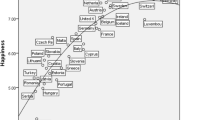Abstract
Using the data from the China Household Finance Survey in 2011, we study the relation between happiness and stockholding. We find that a household’s propensity of investing in stocks or mutual funds, as well as household asset shares invested in stocks or mutual funds, is strongly associated with happiness. Moreover, empirical results suggest that among the three potential channels we propose, the association between happiness and stockholding is driven by trust (or social capital), rather than households’ risk preference or optimism level.


Similar content being viewed by others
Notes
The cumulative variance of the first principal component is 83.11 %.
The 2008 Sichuan earthquake, also known as the Wenchuan earthquake, was a deadly earthquake that measured at 8.0 Ms and 7.9 Mw and occurred at 02:28:01 PM China Standard Time at epicenter (06:28:01 UTC) on Monday, May 12, 2008 in the Sichuan province, killing 69,195 people, with 18,392 missing.
Based on this “obey” question, we calculate the mean of answers given by households for each province.
Housing with formal property (HFP) refers to commercial residency in China with both the “Building Ownership Certificates” and the “state-owned land use warrants,” which are built on the legal building sites and can be legally traded.
Housing with informal property (HIP) refers to the cheap buildings built on collective land in China, particularly in rural areas. Farmers did not pay the land grant fee and other required fees for houses, and the property ownership certificates are not issued by the national housing agency, but rather by the Local Township or village government, which are legally invalid.
The China Institute of City Competitiveness was founded in 1998 in Hong Kong; it endeavors to study the competitiveness of China’s cities and promote the image of China’s cities’ vigor, competitiveness, and sustained development as a whole. Since 2002, they have published China Cities of Competitiveness Ranking List annually. Based on the GN indicator system developed by CICC for China’s international influence, they recruit experts and scholars from home and abroad to conduct the study and assess cities’ competitiveness and finally make the selection among 289 Chinese cities.
To calculate residual happiness, we first estimate the happiness regression using several determinants of happiness (shown in Table 3). Then we use the residual in second column of Table 3 as the instrumental variable of absolute happiness to test the key findings in the paper, which is similar to the method used in Krause (2013).
References
Arkes, H. R., Herren, L. T., & Isen, A. M. (1988). The role of potential loss in the influence of affect on risk-taking behavior. Organizational Behavior and Human Decision Processes, 42(2), 181–193.
Bayer, P. J., Bernheim, B. D., & Scholz, J. K. (2009). The effects of financial education in the workplace: Evidence from a survey of employers. Economic Inquiry, 47(4), 605–624.
Bernheim, B. D., & Garrett, D. M. (1996). The determinants and consequences of financial education in the workplace: Evidence from a survey of households. National Bureau of Economic Research.
Blanchflower, D. G., & Oswald, A. J. (2004). Well-being over time in Britain and the USA. Journal of public economics, 88(7), 1359–1386.
Brueckner, J. K. (1997). Consumption and investment motives and the portfolio choices of homeowners. The Journal of Real Estate Finance and Economics, 15(2), 159–180.
Clark, A. E., Diener, E., Georgellis, Y., et al. (2008a). Lags and leads in life satisfaction: a test of the baseline hypothesis*. The Economic Journal, 118(529), F222–F243.
Clark, A. E., Frijters, P., & Shields, M. A. (2008b). Relative income, happiness, and utility: An explanation for the Easterlin paradox and other puzzles. Journal of Economic Literature, 46(1), 95–144.
Clark, A. E., & Oswald, A. J. (1994). Unhappiness and unemployment. The Economic Journal, 104(424), 648–659.
Cocco, J. F. (2005). Portfolio choice in the presence of housing. Review of Financial studies, 18(2), 535–567.
Coombs, R. H. (1991). Marital status and personal well-being: A literature review. Family Relations, 40(1), 97–102.
Cryder, C. E., Lerner, J. S., Gross, J. J., et al. (2008). Misery is not miserly sad and self-focused individuals spend more. Psychological Science, 19(6), 525–530.
Diener, E. (2000). Subjective well-being: The science of happiness and a proposal for a national index. American Psychologist, 55(1), 34.
Dunn, J. R., & Schweitzer, M. E. (2005). Feeling and believing: the influence of emotion on trust. Journal of Personality and Social Psychology, 88(5), 736.
Easterlin, R. A. (1974). Does economic growth improve the human lot? Some empirical evidence. Nations and Households in Economic Growth, 89, 89–125.
Easterlin, R. A. (1995). Will raising the incomes of all increase the happiness of all? Journal of Economic Behavior & Organization, 27(1), 35–47.
Easterlin, R. (2003). Do aspirations adjust to the level of achievement? European science foundation workshop on income, interactions, and subjective well being, September, Paris.
Europa der Bürger? Voraussetzungen, Alternativen, Konsequenzen. Campus, 1998.
Flavin, M., & Yamashita, T. (2002). Owner-occupied housing and the composition of the household portfolio. American Economic Review, 92(1), 345–362.
Fratantoni, M. C. (2001). Homeownership, committed expenditure risk, and the stockholding puzzle. Oxford Economic Papers, 53(2), 241–259.
Frey, B. S., & Stutzer, A. (2000). Happiness, economy and institutions. The Economic Journal, 110(466), 918–938.
Frey, B. S., & Stutzer, A. (2002). What can economists learn from happiness research? Journal of Economic literature, 40(2), 402–435.
Gilbert, D. (2006). Stumbling on happiness. Vintage.
Glenn, N. D., & Weaver, C. N. (1988). The changing relationship of marital status to reported happiness. Journal of Marriage and the Family, 50(2), 317–324.
Gove, W. R., Hughes, M., & Style, C. B. (1983). Does marriage have positive effects on the psychological well-being of the individual? Journal of Health and Social Behavior, 24(2), 122–131.
Gove, W. R., & Shin, H. C. (1989). The psychological well-being of divorced and widowed men and women an empirical analysis. Journal of Family Issues, 10(1), 122–144.
Graham, C., Eggers, A., & Sukhtankar, S. (2004). Does happiness pay? An exploration based on panel data from Russia. Journal of Economic Behavior & Organization, 55(3), 319–342.
Grinblatt, M., & Keloharju, M. (2001). How distance, language, and culture influence stockholdings and trades. The Journal of Finance, 56(3), 1053–1073.
Grossman, S. J., & Laroque, G. (1990). Asset pricing and optimal portfolio choice in the presence of illiquid durable consumption goods. Econometrica, 58, 25–51.
Guiso, L., Jappelli, T., & Terlizzese, D. (1996). Income risk, borrowing constraints, and portfolio choice. The American Economic Review, 86(1), 158–172.
Guiso, L., Sapienza, P., & Zingales, L. (2008). Trusting the stock market. The Journal of Finance, 63(6), 2557–2600.
Guiso, L., Sapienza, P., & Zingales, L. (2010). Civic capital as the missing link. National Bureau of Economic Research.
Guven, C. (2009). Weather and financial risk-taking: Is happiness the channel?. School of Accounting, Economics and Finance, Deakin University.
Guven, C. (2011). Are happier people better citizens? Kyklos, 64(2), 178–192.
Guven, C. (2012). Reversing the question: Does happiness affect consumption and savings behavior? Journal of Economic Psychology, 33(4), 701–717.
Heaton, J., & Lucas, D. (2000). Portfolio choice and asset prices: The importance of entrepreneurial risk. The Journal of Finance, 55(3), 1163–1198.
Helliwell, J. F., Barrington-Leigh, C. P., & Harris, A., et al. (2009). International evidence on the social context of well-being. National Bureau of Economic Research.
Helliwell, J. F., & Putnam, R. D. (2004). The social context of well-being. Philosophical Transactions-Royal Society of London Series B Biological Sciences, 359(1449), 1435–1446.
Hong, H., Kubik, J. D., & Stein, J. C. (2004). Social interaction and stock-market participation. The journal of finance, 59(1), 137–163.
Iaffaldano, M. T., & Muchinsky, P. M. (1985). Job satisfaction and job performance: A meta-analysis. Psychological Bulletin, 97(2), 251.
Johnson, E. J., & Tversky, A. (1983). Affect, generalization, and the perception of risk. Journal of Personality and Social Psychology, 45(1), 20.
Kahn, B. E., & Isen, A. M. (1993). The influence of positive affect on variety seeking among safe, enjoyable products. Journal of Consumer Research, 20(2), 257–270.
Kahneman, D., & Krueger, A. (2006). Developments in the measurement of subjective well-being. Journal of Economic Perspectives, 20(1), 3–24.
Kasser, T., & Ryan, R. M. (1993). A dark side of the American dream: correlates of financial success as a central life aspiration. Journal of Personality and Social Psychology, 65(2), 410.
Kenny, C. (1999). Does growth cause happiness, or does happiness cause growth? Kyklos, 52(1), 3–25.
Kleindorfer, P. R., & Kunreuther, H. C. (1993). Decision sciences: An integrative perspective. New York: Cambridge University Press.
Knight, J., Song, L., & Gunatilaka, R. (2009). Subjective well-being and its determinants in rural China. China Economic Review, 20(4), 635–649.
Krause, A. (2013). Don’t worry, be happy? Happiness and reemployment.
Kroll, C. (2011). Different things make different people happy: Examining social capital and subjective well-being by gender and parental status. Social Indicators Research, 104(1), 157–177.
Loewenstein, G. F., Weber, E. U., Hsee, C. K., et al. (2001). Risk as feelings. Psychological Bulletin, 127(2), 267.
Mitrut, A., & Wolff, F. C. (2011). Do private and public transfers received affect life satisfaction? Evidence from Romania. Journal of Economic Psychology, 32, 969–979.
Moore, S. C., & Chater, N. (2003). The influence of affect on risky behavior: From the lab to real world financial behavior. In Proceedings of the 23rd annual conference of the cognitive science society. Mahwah, NJ: Erlbaum, pp. 822–827.
Rosen, H. S., & Wu, S. (2004). Portfolio choice and health status. Journal of Financial Economics, 72(3), 457–484.
Shim, S., Serido, J., & Tang, C. (2012). The ant and the grasshopper revisited: The present psychological benefits of saving and future oriented financial behaviors. Journal of Economic Psychology, 33(1), 155–165.
Stillman, T. F., Fincham, F. D., Vohs, K. D., et al. (2012). The material and immaterial in conflict: Spirituality reduces conspicuous consumption. Journal of Economic Psychology, 33(1), 1–7.
Van Winden, F., Krawczyk, M., & Hopfensitz, A. (2011). Investment, resolution of risk, and the role of affect. Journal of Economic Psychology, 32(6), 918–939.
Vissing-Jorgensen, A. (2002). Towards an explanation of household portfolio choice heterogeneity: Nonfinancial income and participation cost structures. National Bureau of Economic Research.
Warr, P. (1999). Well-being and the workplace. In D. Kahneman, E. Diener & N. Schwarz (Eds.), Well-being: The foundations of hedonic psychology (pp. 392–412). New York: Russell-Sage.
Wu, J., Gyourko, J., & Deng, Y. (2012). Evaluating conditions in major Chinese housing markets. Regional Science and Urban Economics, 42(3), 531–543.
Author information
Authors and Affiliations
Corresponding author
Additional information
Foundation item: Project (71301169, 71372063) supported by the National Natural Science Foundation of China.
Rights and permissions
About this article
Cite this article
Rao, Y., Mei, L. & Zhu, R. Happiness and Stock-Market Participation: Empirical Evidence from China. J Happiness Stud 17, 271–293 (2016). https://doi.org/10.1007/s10902-014-9594-4
Published:
Issue Date:
DOI: https://doi.org/10.1007/s10902-014-9594-4




